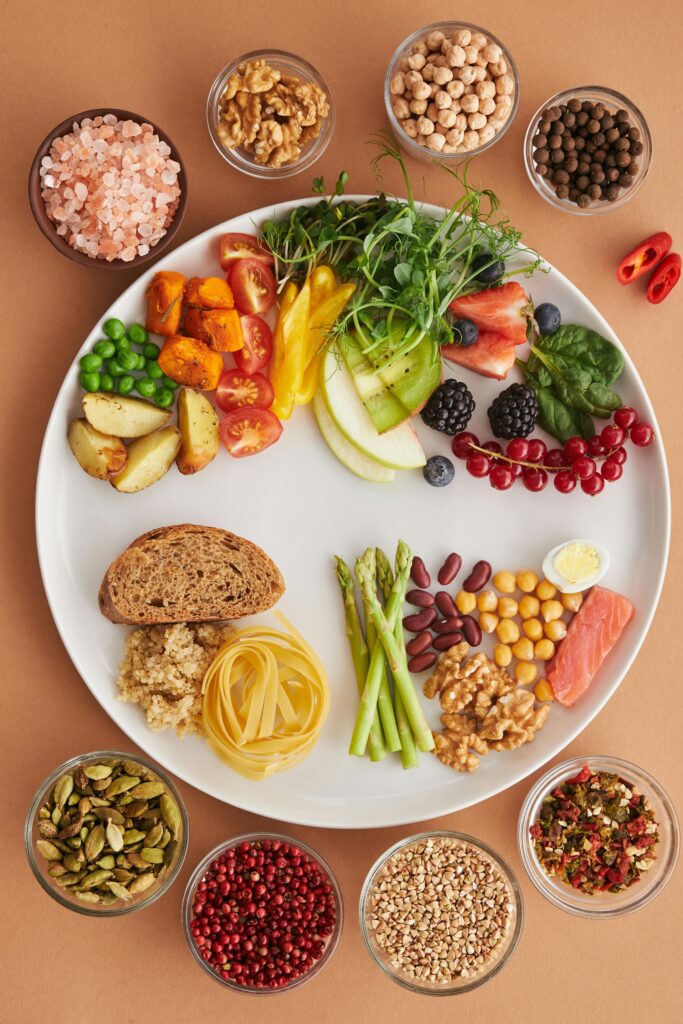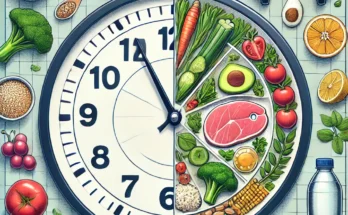Living in a world where fad diets and nutrition advice abound as much as fast-food restaurants, finding one’s way to a healthy diet could be an encompassing trip. An ideal body weight, improved health markers, or enhanced fitness performance could be great desires that put one in the trap of trendy diets without proper knowledge. Yet, these are not exactly a case of joining the latest bandwagon; instead, there’s some underlying truth regarding nutrition, metabolism, and patterns in general life that plays a role. Here are ten little secrets which will help you reach your dieting goals without wasting your precious time and energy.

Dieting Goals
Table of Contents
1. The Calories Count, But Not All Calories Are Created Equal**
Perhaps one of the more pervasive dieting myths is the thought that weight loss is solely a factor of “calories in versus calories out.” While the notion is somewhat true in itself-less in and more calories out means more weight shed-all calories are most certainly not all created equal. Calories from highly processed foods, added sugars, and unhealthy fats really tend to act differently in your body compared to calories from whole, nutrient-dense foods.
as the you are going to a achieve dieting goals, As for example, the 500 calories from the sweet snack-a doughnut-can give a temporary lift of energy and then a plunge, leaving you tired and hungry. On the other hand, 500 calories consisting of lean proteins, complex carbohydrates, and healthy fats keep you filled for a long time, energetic, and satisfied. What you put into your body has a direct consequence on your metabolism, hormones, and even mood-all vital elements to diet sustainability.
2. Metabolism Is Not Fixed for dieting goals
Most people believe that metabolism is one flat number and it’s something one is born with and can never change. Although genetics certainly do influence metabolic rate, it is far from fixed. Your metabolic rate may be influenced by a number of variables including muscle mass, physical activity, and even the types of foods you eat.
Muscle, for example, requires more calories to rest than fat tissue does, which is the reason muscle mass development through resistance training boosts metabolism. Metabolism can also be enhanced through the addition of nutritionally high protein foods since the thermogenic effect of food, or TEF, described as the energy the human body expels to digest, absorb, and process nutrients is synonymous with protein metabolism.
For dieting goals Don’t be misled into thinking that you are condemned to having a “slow metabolism.” In fact, your metabolism can actually be boosted over a period of time by living a healthier life, which includes regular exercise and eating a high-protein, high-fiber diet.
3.Severe Dieting Slows Down Progress Over Time**
Crash diets can promise quick fixes, but they actually work more harm than good. Very-low-calorie diets indeed can cause speedy weight loss, yet a lot of the weight one loses is due to water rather than fat, along with some muscle and glycogen stores. Moreover, when drastically cutting calories, the body goes into “starvation mode,” which slows metabolism down to conserve energy.
This slower metabolism makes it harder to take the fat off in the long run. In addition, any drastic calorie-cutting diet could lead to nutrient deficiency, irritability, fatigue, and even the loss of your muscles. So, instead of going on crash diets, focus on creating a moderate calorie deficit which you can sustain over a longer period. That way, you can lose fat without compromising muscle mass or energy levels.
4.Carbs Are Not Your Enemy**
Popular diets, especially low-carb and ketogenic diets, have demonized carbohydrates by claiming that cutting carbs is the secret toward weight loss. Although reduction in refined carbs such as white bread, pastry, and sugary drinks does a lot of good to the health of a person, not all carbohydrates are the same.
Complex carbohydrates include whole grains, fruits, vegetables, and legumes, which provide the body with energy, fiber, and essential nutrients. They support blood sugar control, digestive health, and sustained energy levels during exercise. If weight loss or improvement in health is your goal, consider the type of carbohydrate you consume instead of eliminating them from your system altogether.
5. Protein Is Key for Weight Loss and Muscle Maintenance**
Because protein is such an important nutrient for weight loss and maintenance of muscle, it serves to enhance satiety-meaning after meals, you will feel full longer, and that can help reduce calorie intake throughout the day. Besides that, this nutrient has a greater thermic effect than fats and carbohydrates, which means your body will burn more calories while digesting and metabolizing protein.
If one is looking to reduce weight, retention of muscle mass is important because more muscle tissue can lead to burning more calories at rest. Protein in every meal can help protect against muscle loss during weight loss and facilitate recovery from exercise.
Good examples of protein sources are lean meats, fish, eggs, dairy products, legumes, nuts, and seeds. A mix of these sources in a person’s diet will adequately supply his daily needs of protein.
6. Consistency Beats Perfection
Arguably, one of the single largest reasons that people fail in achieving their diet goals is in pursuing perfection. When one always tries to eat perfectly, any little slip-up can feel like it were a major failure; this too easily leads into a cycle downhill, eventually overeating and stopping altogether. However, when considering long-term dietary success, consistency is more crucial than perfection.
And that’s OK: it’s OK to have a piece of cake at someone’s birthday, or to have a cheat meal every now and then, providing you’re being consistent day in and day out with healthy eating. Instead, try adopting an 80/20 balance-not trying to be perfect 100%, but rather shoot for 80% of your diet needing to be from wholesome, healthy foods, and 20% can be all those other indulgent things.
7. Hydration Affects Appetite and Fat Burning**
Water plays a role in nearly every bodily function, from processes of digestion and metabolism to fat loss. More often than not, feelings of hunger are actually the body calling for its need for water. Drinking water before meals can suppress appetite and consequently reduce total food calories intake.
Besides, water does play a role in fat metabolism. The moment when your body starts to break down fat for energy, stored fat is immediately released into the bloodstream as fatty acids and glycerol, which will then require water in order to be correctly metabolized and passed out of the body. Drinking throughout the day will help with weight loss and overall health.
8. Sleep and Stress Impact Your Diet**
Dieting is not only about what one consumes, but it is very much about how the body functions on an overall basis. Two of the most overlooked elements that have much to do with one’s ability to reach diet-related goals are sleep and stress. The lack of chronic sleep and high levels of stress can interrupt the balance of hormones within an individual, which in turn can make reducing weight a bit more problematic.
When you fail to get adequate rest, your body manufactures more of the hunger hormone, ghrelin, and less of the fullness hormone, leptin. This could very well equate to an increase in cravings and overeating, mainly those foods high in calories. Besides this, stress triggers the release of cortisol, a hormone linked to the accumulation of fat, particularly in the abdominal area.
In addition to getting sufficient sleep, reduce your level of stress by using mindfulness, exercise, or other forms of relaxation. This will greatly enhance your potential for dieting success.
9. Exercise Alone Isn’t Enough**
It is a big component of any weight loss program, but by no means should it ever replace good nutrition. Too many are overestimating how much they burn through exercise and then eat that much more to make up for it, which simply slows the process. Without proper nutrition, your body will be without the fuel to perform well in workouts and recover properly afterward, let alone even build muscle.
Combine regular exercise for maximum effects with a diet filled with whole foods, lean proteins, healthy fats, and complex carbs. In particular, resistance training develops muscles that accelerate metabolism and burn fat. Cardio workouts develop a healthy cardiovascular system, while burning calories; these, too, are supplemental to a nutritious diet.
10.A Good Diet Is Something You Stick to for Life**
The term “diet” can connote a temporary change in eating, but for the record, it is actually all about sustainability in nutrition. If you consider your diet to be something you are only going to do until you reach your goals of weight or health, once it ends, so will the diet.
Replace the mindset of short-term dieting with long-term changes in your eating that can be followed lifelong. Follow a pattern of eating that appeals to personal preference, will maintain health, yet permit indulgence occasionally without cause for guilt. A sustainable diet does not feel deprived or dismal but one that improves life by strengthening energy, health, and enjoyment.
Conclusion: Stop Wasting Time—Get the Facts That Will Bring You Lasting Success
Reaching your diet goals can be an overwhelming process, but with the right kind of knowledge guiding you, you can avoid common pitfalls and wasted effort. Remember: yes, calories count, but calories don’t count equally. Crash diets won’t bring lasting results, and it’s consistency that matters more than perfection. In all, whole food, proper hydration, adequate rest, and healthy sustainable habits are the keys to your goal of being healthy and reaching a healthy weight efficiently, maintaining your results in the process. Give yourself a head start with these essential facts, and you’re on a right track for success over the long haul-never waste your precious time chasing quick fixes.




